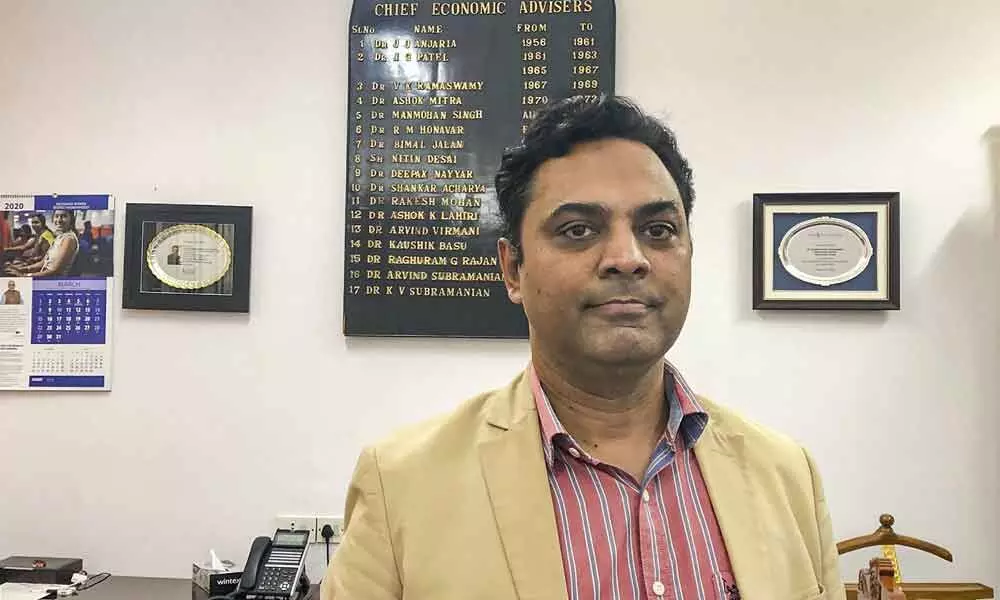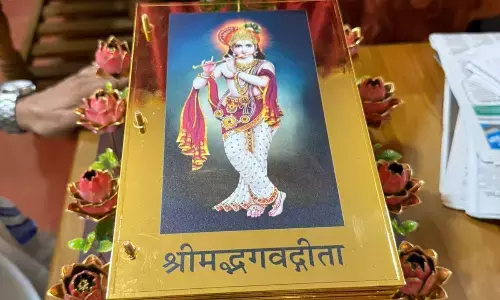Indian banks well capitalised: CEA Krishnamurthy Subramanian
 Chief Economic Adviser Krishnamurthy Subramanian at his office while talking to select media amidst reports of m-cap of banks and their safety, in New Delhi on Sunday
Chief Economic Adviser Krishnamurthy Subramanian at his office while talking to select media amidst reports of m-cap of banks and their safety, in New Delhi on SundayAllaying concerns over banking sector health in the wake of Yes Bank fiasco, Chief Economic Adviser Krishnamurthy Subramanian on Sunday said Indian banks are well capitalised and there is no reason to worry
New Delhi: Allaying concerns over banking sector health in the wake of Yes Bank fiasco, Chief Economic Adviser Krishnamurthy Subramanian on Sunday said Indian banks are well capitalised and there is no reason to worry.
He further said that it is a wrong method to assess a lender's health based on the ratio of deposit to m-cap (market capitalisation).
"What I want to emphatically state that the m-cap ratio is a totally incorrect metric for assessing the safety of the banks. No banking sector expert or banking regulator uses this measure," Subramanian said while addressing a select media persons at his office here.
After what all unfolded about the crisis-hit Yes Bank recently, top government functionaries including Finance Minister Sitharaman, RBI Governor Shaktikanta Das and the chief economic advisor have been trying to assuage panicked investors.
The CEA said that no banking sector experts or regulators use deposit/m-cap ratio as a measure to gauge resilience of banks rather it is the capital to risk weighted assets ratio (CRAR) and other such metrics that can rightly gauge the health of banks.
"What banking sector experts and regulators use is what is called the CRAR. It is important to keep this in mind that the international norms for CRAR is 8 per cent and Indian banks on an average have a CRAR of 14.3 per cent.
"So, 8 per cent is the mandated minimum norm and our banks on the average have 14.3 per cent (CRAR). Now 14.3 per cent versus 8 per cent almost translates into 80 per cent greater capital than the international norms," he said.
He further said that the Reserve Bank of India (RBI) mandates the Indian banks to keep CRAR at 9 per cent. "Even compared to that our banks have 60 per cent more capital.
So this is something that is very important." Giving reasons as to why the deposit/m-cap ratio is an incorrect measure to assess the health of the banks, he said the m-cap ratio is essentially the ratio of the deposits that a bank has to its market capitalisation.
"Now if you compare for instance any bank lets' say a private sector bank with the State Bank of India, State Bank of India would have an order of magnitude of higher m-cap ratio.
"But the State Bank of India is as safe as the any other bank in the world. In fact it is the only Indian bank to be the part of the top 100 banks internationally." So this ratio does not really capture the safety of a bank because it is actually affected by the market capitalisation.
"As you all know the stock price of a bank can change minute to minute, as a result the m-cap ratio will also change minute to minute, but the solvency cannot change minute to minute," Subramanian said.
He also emphasised that the Indian banks on an average have a CRAR of 14.3 per cent, which is way higher -- about 80 per cent greater than the global measures.
"So our banks on an average are very-very well capitalised, so there is absolutely no reason to worry. Also, the government has increased the limit for deposits that are insured to up to Rs 5 lakh, which covers a large majority of the deposits.
"Together with the fact that our banks are well capitalised and the fact that the deposits are well taken care of, there is absolutely no reason for anyone to worry," he said.
















